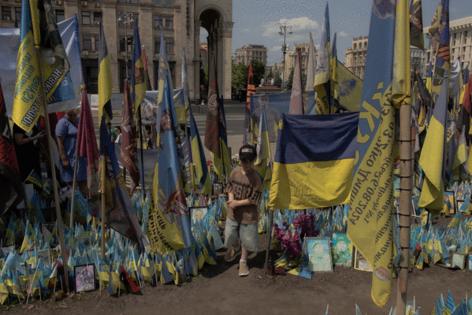John M. Crisp: Putin is doing to Trump what Trump does to everyone else
Published in Op Eds
Russian President Vladimir Putin did something odd on May 24: He launched 367 drones and missiles against a number of Ukrainian cities, including Kyiv. At least 12 people were killed, including children, and dozens were injured.
I’m calling this odd—hold that thought for a moment—but there’s nothing unusual about it. The only person who appears to be surprised by another Russian attack on Ukrainian civilians was President Donald Trump, who said, “I’ve always had a very good relationship with Vladimir Putin of Russia, but something has happened to him. He has gone absolutely CRAZY!”
Trump added that Putin is “needlessly killing a lot of people…missiles and drones are being shot into Cities in Ukraine, for no reason whatsoever.”
Trump gets the “needlessly killing a lot of people” part right. He seems to be discovering what everyone already knows: Putin is a killer. He’s not just an indifferent perpetrator of collateral damage in an unjust war, he’s a murderer who doesn’t hesitate to use violence to eliminate political enemies.
This is the man that Trump calls “a strong leader.”
But Trump also seems to recognize the odd part of Putin’s attacks on Ukrainian civilians, calling them “Not necessary, and very bad timing.”
Putin is winning the war in Ukraine. His most decisive victory occurred on Nov. 5, 2024, when Trump was elected president. The coalition organized by former President Joe Biden to resist Putin’s unprovoked attack on Ukraine was seriously undermined by the election. Trump has not only threatened to cut off American aid to Ukraine and alienated Europeans who support Ukraine, but he has suggested a false, sickening equivalence of blame for this war.
Putin is still a long way from his goal, which is complete control of Ukraine and, at least, some of the Baltic states. But the “peace” plan that would be acceptable to Trump and Putin—Ukraine is a different matter—would provide the pause in the war that would allow Putin to consolidate his gains, reconstitute and rearm his military and plan his much-desired reestablishment of some version of the sphere of influence that the Soviet Union enjoyed.
So why, with this tactical victory within reach, would Putin commit war crimes against Ukrainian civilians, risking a reawakening of American resistance to his war on Ukraine or, more likely, strengthening European resolve, in lieu of help from the United States, to preserve the liberal world order established after World War II?
Here’s my theory: Interactions among nations are often driven by rational motivations that emerge from competing economic interests. Nations tend to fight over resources. Sometimes conflicts develop over rival ideologies, but even they often have economic foundations.
But sometimes wars are initiated and prolonged by the personalities and temperaments of national leaders, which helps explain why we fought so long in Vietnam or invaded Iraq, at all.
Putin is a cruel criminal. But he’s also a bully, a warped alpha male. He knows he’s got the upper hand in Ukraine, but it’s not enough just to win, he has to humiliate and dominate. To rub his opponents’ noses in their defeats. Killing a few civilians without any useful military purpose is a small price for Putin to pay in order to demonstrate his dominance.
And nothing gratifies an alpha male more than humiliating another alpha male. Compared to Putin, Trump is an amateur. Still, Trump is in a position to have an appreciation for some of Putin’s motivations: Just winning is never enough for Trump, either.
Civilization faces two daunting crises, compared with which all others—immigration, the global economy, the commercialization of the presidency—are insignificant. Climate change is a genuine threat to civilization or, at least, to the sort of life that we’ve grown to enjoy. The other great crisis is the ideological battle between the values that the U.S. cultivated and nurtured after World War II—democracy, freedom of speech, rule of law, tolerance, legitimate elections—and the opposite values largely embraced by our adversaries. That conflict is being played out in Ukraine.
Unfortunately, the outcomes of both crises are in considerable doubt.
_____
_____
©2025 Tribune Content Agency, LLC

























































Comments